|
|
|
Sort Order |
|
|
|
Items / Page
|
|
|
|
|
|
|
| Srl | Item |
| 1 |
ID:
186681
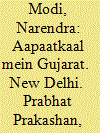

|
|
|
|
|
| Publication |
New Delhi, Prabhat Prakashan, 2014.
|
| Description |
227p.hbk
|
| Contents |
Book in Hindi Language.
|
| Standard Number |
817315466X
|
|
|
|
|
|
|
|
|
|
|
|
Copies: C:1/I:0,R:0,Q:0
Circulation
| Accession# | Call# | Current Location | Status | Policy | Location |
| 060214 | 320.9/MOD 060214 | Main | On Shelf | General | |
|
|
|
|
| 2 |
ID:
120772
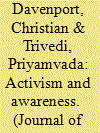

|
|
|
|
|
| Publication |
2013.
|
| Summary/Abstract |
There are a great number of outcomes for activism that are examined in the literature, but we know relatively little about how this behavior influences perceptions of the phenomena being challenged. It is possible that when one challenges some phenomenon, one begins to 'see' it more. Alternatively, activism might focus awareness on only certain manifestations of the problem of interest. The type of activism should matter here. We anticipate that only forms of resistance that increase exposure to oppression/oppressors and/or other challengers are likely to increase the number of discriminatory actions identified. Especially important here is nonviolent direct action because of the significant amount of training and interaction among activists that is facilitated by such activities as well as the extensive amount of exposure that nonviolence generally subjects participants to. Utilizing a unique database of 98,316 untouchables (or Dalits) from 1,589 rural villages in Gujarat, India, we find support for our argument. Specifically, Dalits who engaged in nonviolent action which increased either exposure to oppression/oppressors or exposure to other activists but not both, identified a higher number of discriminatory events. In short, some activism does activate some awareness. This has implications for dissident commitment, radicalization, and post-conflict political processes.
|
|
|
|
|
|
|
|
|
|
|
|
|
|
|
|
| 3 |
ID:
020977
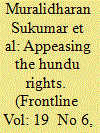

|
|
|
|
|
| Publication |
March 16-29, 2002.
|
| Description |
4-23
|
|
|
|
|
|
|
|
|
|
|
|
|
|
|
|
| 4 |
ID:
128035
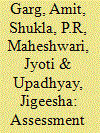

|
|
|
|
|
| Publication |
2014.
|
| Summary/Abstract |
Gujarat, a large industrialized state in India, consumed 67 TWh of electricity in 2009-10, besides experiencing a 4.5% demand-supply short-fall. Residential sector accounted for 15% of the total electricity consumption. We conducted load research survey across 21 cities and towns of the state to estimate residential electricity load curves, share of appliances by type and usage patterns for all types of household appliances at utility, geographic, appliance, income and end-use levels. The results indicate that a large scope exists for penetration of energy efficient devices in residential sector. Marginal Abatement Cost (MAC) curves for electricity and CO2 were generated to analyze relative attractiveness of energy efficient appliance options. Results indicate that up to 7.9 TWh of electricity can be saved per year with 6.7 Mt-CO2 emissions mitigation at negative or very low CO2 prices of US$ 10/t-CO2. Despite such options existing, their penetration is not realized due to myriad barriers such as financial, institutional or awareness and therefore cannot be taken as baseline options for CO2 emission mitigation regimes.
|
|
|
|
|
|
|
|
|
|
|
|
|
|
|
|
| 5 |
ID:
108996
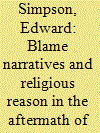

|
|
|
|
|
| Publication |
2011.
|
| Summary/Abstract |
Recent writing on religion in Gujarat has often confused political rhetoric with common religious belief and practice. Thus, religious categories have become caricatures standing for sociological realities and totalised worldviews. In this scheme, 'Hindus' and 'Muslims' are supposed to believe different things which ensure that they see and act in the world quite differently. In this paper, I examine the narratives of blame that emerged after the 2001 earthquake in Gujarat. The ethnography suggests that although religious identity plays a role in the way blame is cast, people of different religious communities also use common frames of logic and their shared experiences of shock and alienation to explain catastrophe. The religious reasoning of blame narratives is therefore shown to have a broader cultural existence outside the boundaries of particular religious identities.
|
|
|
|
|
|
|
|
|
|
|
|
|
|
|
|
| 6 |
ID:
082165
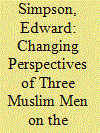

|
|
|
|
|
| Publication |
2008.
|
| Summary/Abstract |
In many religious traditions, those who mediate relations between men and gods are often the focus of controversy and moral ambiguity. The ethnography in this paper outlines a number of perspectives on the role of such intermediaries (here 'saints') in Muslim society in western India. In the South Asian literature, historians have provided a thorough treatment of the doctrinal history and content of these debates. However, very little attention has been paid to how living individuals interpret and rehearse these debates in practice. The examination of the changing perspectives of three Muslim men on the question of saint worship over a 10 year period reveals the following. First, an individual's relationship with 'saints' is often determined primarily by social context rather than simply by doctrinal allegiance or the compulsions of particular 'beliefs'. Second, discourses of religious reform are also powerful social objects that can be used as political instruments for purposes other than simply refining the religious practices of a community. Finally, many commonplace assumptions in the literature-notably on the nature of belief and the significance of doctrinal divisions among Muslims-do not withstand ethnographic scrutiny.
|
|
|
|
|
|
|
|
|
|
|
|
|
|
|
|
| 7 |
ID:
113365


|
|
|
| 8 |
ID:
187441
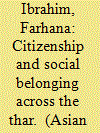

|
|
|
|
|
| Summary/Abstract |
In this article, I examine the 1971 war (better known as the war for the liberation of Bangladesh) from a western Indian perspective. I argue that this war between India and Pakistan—while it focused overtly on the independence of East Pakistan—had some significant consequences for the western border between Kutch (in Gujarat state) and Sindh (in Pakistan). I suggest that this military conflict and the subsequent brief Indian occupation of Tharparkar in Sindh allows for a significant re-thinking of questions of citizenship, identity and belonging that were sparked off in 1947 and that have been re-ignited in the context of recent debates over the controversial Citizenship Amendment Act (CAA), enacted in December 2019.
|
|
|
|
|
|
|
|
|
|
|
|
|
|
|
|
| 9 |
ID:
139442
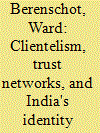

|
|
|
|
|
| Summary/Abstract |
With an election campaign for a seat in Gujarat's state parliament as its backdrop, this article relates India's persistent forms of identity politics to the evolution of trust networks. Political scientists and anthropologists have adopted highly divergent approaches to account for the ways in which India's politicians use social identities to mobilize support. A point of convergence, this article argues, lies in the social networks through which people solve everyday problems and organize access to state resources. Discussing the ever-changing salience of social divisions in Gujarat's politics – from class to caste to religion and region – this article argues that two characteristics of such trust networks – the extent to which these networks are organized along social divides and the extent to which they lend themselves to facilitating clientelistic exchanges with politicians – can foster or impede the political salience of these social divisions. The particular historical development of trust networks and their entanglement in patronage networks impacts the likelihood of the emergence of divisive political discourse.
|
|
|
|
|
|
|
|
|
|
|
|
|
|
|
|
| 10 |
ID:
133676
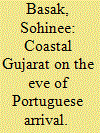

|
|
|
|
|
| Publication |
2014.
|
| Summary/Abstract |
History helps in understanding as well as in formulating policies. India being a peninsular country, various maritime dimensions have played a very important role in moulding its history. The paper attempts to study the Gujarat coast on the eve of the Portuguese arrival in the region as a colonial power in the 16th century. The paper roughly studies coastal Gujarat in the 15th century and the first few decades of the 16th century, by tracing the indigenous market systems, trade routes and commodity transport network, and studies the factors that paved the way for Portuguese dominance in the region.
|
|
|
|
|
|
|
|
|
|
|
|
|
|
|
|
| 11 |
ID:
144136
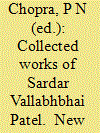

|
|
|
|
|
| Publication |
New Delhi, Konark Publishers Pvt Ltd, 2015.
|
| Description |
xxxix, 393p.hbk
|
| Contents |
Vol. II (1926-1929): Flood relief in Gujarat and historic Bardoli Satyagraha, nation
hails Vallabhbhai as Sardar.
|
| Standard Number |
9789322008444
|
|
|
|
|
|
|
|
|
|
|
|
Copies: C:1/I:0,R:1,Q:0
Circulation
| Accession# | Call# | Current Location | Status | Policy | Location |
| 058585 | 954.035/CHO 058585 | Main | On Shelf | Reference books | |
|
|
|
|
| 12 |
ID:
144139
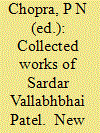

|
|
|
|
|
| Publication |
New Delhi, Konark Publishers Pvt Ltd, 2015.
|
| Description |
xxix, 244p.hbk
|
| Contents |
Vol. V (1 January 1935 - 31 December 1935): Chairman of Congress Parliamentary
Board prepares the country for provincial elections organises Plague relief
work in Gujarat.
|
| Standard Number |
9789322008444
|
|
|
|
|
|
|
|
|
|
|
|
Copies: C:1/I:0,R:1,Q:0
Circulation
| Accession# | Call# | Current Location | Status | Policy | Location |
| 058588 | 954.035/CHO 058588 | Main | On Shelf | Reference books | |
|
|
|
|
| 13 |
ID:
034496
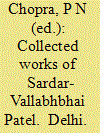

|
|
|
|
|
| Publication |
DelhI, Konark Publishers Pvt Ltd, 1991.
|
| Description |
xxxviii, 393p.Hbk
|
| Contents |
Vol.II: (1926-1929) flood relief in Gujarat and historic Bardoli satyagraha, nation hails
Vallabhbhai as Sardar.
|
| Standard Number |
8122002528
|
|
|
|
|
|
|
|
|
|
|
|
Copies: C:1/I:0,R:0,Q:0
Circulation
| Accession# | Call# | Current Location | Status | Policy | Location |
| 033548 | 923.254/CHO 033548 | Main | On Shelf | General | |
|
|
|
|
| 14 |
ID:
172206
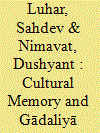

|
|
|
|
|
| Summary/Abstract |
Focused on the cultural memory of the Gādaliya Luhār community in Gujarat, this article discusses ways in which oral traditions and cultural memory among nomadic groups in India shape the identity of a community under the challenge of cultural amnesia. The Gādaliyā Luhārs claim Rājpūt status and close association with the kings of the Mewar region of Rajasthan, but experienced double cultural amnesia, first under the Mughals and later in the British Empire, which affected their identity. The article seeks to assess the authenticity of the community’s assertions of cultural memory in the light of some historical documents and asks to what extent cultural memory through oral narratives can be taken as valid evidence for understanding the cultural identity of a specific community.
|
|
|
|
|
|
|
|
|
|
|
|
|
|
|
|
| 15 |
ID:
143662
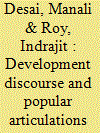

|
|
|
|
|
| Summary/Abstract |
This article discusses how members of marginalized groups in the Indian state of Gujarat make sense of hegemonic discourses about national development in light of their own experiences and material circumstances. For many, the idea of development resonates even when they do not experience material progress in their lives. This partial hegemony of development discourse can be explained by the concept of “political articulation.”. This captures the political process by which parties succeed, at specific historical moments and under certain circumstances, in joining different, even potentially conflictual interests by referring to a common idea and project. The article focuses on Ahmedabad city where the Bharatiya Janata Party (BJP) has created a cross-caste bloc through the trope of development. The BJP has been particularly effective in linking the idea of development to mundane concerns about security, identity and spatial order. However, anxieties about the degradation of labour by increased casualization, informalization, and socio-spatial marginalization have disrupted this common sense linkage and weakened the hegemony of the BJP's model of development.
|
|
|
|
|
|
|
|
|
|
|
|
|
|
|
|
| 16 |
ID:
187094
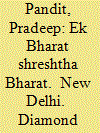

|
|
|
|
|
| Publication |
New Delhi, Diamond Pocket Books (P) Ltd, 2018.
|
| Description |
319p.pbk
|
| Contents |
Book in Hindi Language.
|
| Standard Number |
9789350839058
|
|
|
|
|
|
|
|
|
|
|
|
Copies: C:1/I:0,R:0,Q:0
Circulation
| Accession# | Call# | Current Location | Status | Policy | Location |
| 060230 | 954/PAN 060230 | Main | On Shelf | General | |
|
|
|
|
| 17 |
ID:
116423


|
|
|
| 18 |
ID:
154551
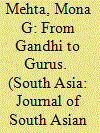

|
|
|
|
|
| Summary/Abstract |
This article compares the public sphere of gurus (‘guru-sphere’) in contemporary Gujarat and that of Gandhi historically as important sites of political contestation. It argues that despite their common use of religious idioms to convey political ideas, Gandhi and the gurus authorise radically different political projects with divergent conceptions of the Hindu subject and Indian polity. The discursive activities of the guru-sphere have helped forge a dominant consensus that endorses Hindutva politics. Operating within a democratic civil society and borrowing from Gandhian idioms, gurus have actively challenged key constitutional values derived from the Gandhian public sphere. The study reveals the paradoxical tendency of Gujarat's public sphere to produce hegemonic monologues over pluralistic dialogues, not in the absence of, but through the institutional mechanisms of, deliberative democracy.
|
|
|
|
|
|
|
|
|
|
|
|
|
|
|
|
| 19 |
ID:
108994
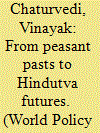

|
|
|
|
|
| Publication |
2011.
|
| Summary/Abstract |
This paper considers the participation and initiation of communities once classified as criminal tribes in the violence in Gujarat in 2002. Given that their descendants continue to suffer politically and economically in post-colonial India, it is necessary to examine the role of the marginalised and subordinate communities in the making of Hindutva in the twenty-first century. Building upon debates on violence in post-colonial societies, the paper examines the historical contexts for why victims often become killers in genocide. More specifically, it provides an analysis of one specific community of poor, low-caste peasants, the Dharalas, who participated in the violence against Muslims in Gujarat. The paper also examines the limits of historical methodology for the writing of histories of violence from 'below'.
|
|
|
|
|
|
|
|
|
|
|
|
|
|
|
|
| 20 |
ID:
107219
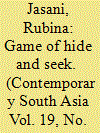

|
|
|
|
|
| Publication |
2011.
|
| Summary/Abstract |
This paper analyses the gendered experience of the state for the Muslim survivors of violence in Gujarat in 2002. Most of the scholarship on the working of the state after communal violence in post-independence India concentrates on the anxiety to re-instate the 'myth of the state', through policies that establish its respectability after violence. The emphasis is on understanding the mechanics of the state, its 'order making' function. Very little attention has been paid to understanding the lived experience of the modern state from a gendered perspective. What studies there have been tend to focus on the internal power structures within nationalist discourses, the patriarchal nature of state assertion, and point to forgotten narratives within the meta-narratives of violence and suffering. There is very little evidence examining how men and women experienced the same process differently, or how they make sense of their experiences, in a context where the lines between order and chaos, legitimacy and illegitimacy and trust and betrayal were constantly being redrawn. In examining memories of loss and suffering, this paper shows the contrasting and shifting ways in which the state is experienced, imagined and granted legitimacy by men and women from the margins.
|
|
|
|
|
|
|
|
|
|
|
|
|
|
|
|
|
|
|
|
|